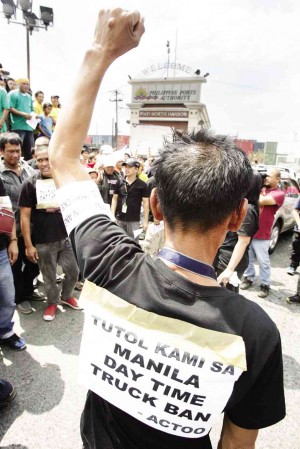Fine for truck ban violators increased

Will there be another “truck holiday” if the MMDA hikes the fine for violators of the truck ban? Truckers staged one in February after Manila officials expanded the truck ban hours in the city. INQUIRER FILE PHOTO
MANILA, Philippines–To reduce the number of truck ban violators, especially on C5 Road and the Katipunan area, the Metropolitan Manila Development Authority (MMDA) will be increasing the fine from P500 to P2,000.
On top of this, it will also recommend the one-year suspension of the driving license of three-time offenders.
Already approved by the Metro Manila Council (MMC)—the policy-making arm of the MMDA—the stiffer penalties were prompted by the agency’s observation that more and more truckers were deliberately violating the ban just to be able to make their deliveries because they could afford to pay the fine.
On the MMDA’s weekly radio program on Sunday, MMDA Assistant General Manager for Operations Emerson Carlos said that they have apprehended more than 20 violators per day on C5 Road and Katipunan for the past months.
“We also received information that truck operators provide the truckers with an additional P500 to cover the fine,” he noted, adding that the amount had become part of the drivers’ expenses.
Article continues after this advertisement“We cannot let that continuously happen as it affects traffic on major streets, especially near universities,” he said.
Article continues after this advertisementDuring the MMC’s meeting on Tuesday, MMDA Chair Francis Tolentino said that the council agreed to raise the P500 penalty, which has been in effect since 1995. He also noted that the higher penalty would take effect 15 days after its publication.
To better enforce the ban, Tolentino added that the MMC was planning to ask the Land Transportation Office to ban a trucker from driving for a year after three violations.
Under the truck ban, trucks and other vehicles with a weight of 4,500 kilograms or more are banned from major thoroughfares between 6 a.m. and 10 a.m. and from 5 p.m. to 10 p.m. on weekdays, except holidays.
All trucks, however, are prohibited from plying Edsa from Magallanes in Makati to North Avenue in Quezon City every day.
Only trucks and vehicles carrying perishable items and petroleum products are exempted from the ban.
Sought for comment, Mary Zapata, president of the Aduana Business Club Inc. (ABCI), an organization of truckers, importers, exporters and licensed brokers, said that the increase in fines was “not a welcome development.”
“It’s part of confusing regulations, particularly between the old measures and new ones like these,” she said in a telephone interview.
Zapata added that while concessions, such as the 24-hour truck lane on Roxas Boulevard, were helpful in helping them complete their deliveries, other new measures might be confusing to truckers.
“This presents a new problem to truckers. Which ‘truck ban’ will this become part of? There are so many clarificatory points we have to talk about,” she said.
Zapata said that the ABCI would wait for a copy of the MMC resolution before they discuss their next move.
When asked by the Inquirer, she said that she did not have figures for how many of their members had been apprehended for violating the truck ban in different parts of Metro Manila.
“However, many of them got caught violating the truck ban because of [certain] situations,” she said, stressing that most of those who were apprehended did not violate the ban deliberately.
“There are situations that the drivers cannot control. [In those] cases, we need common sense to prevail. Enforcers should be aware of the situation,” Zapata pointed out.